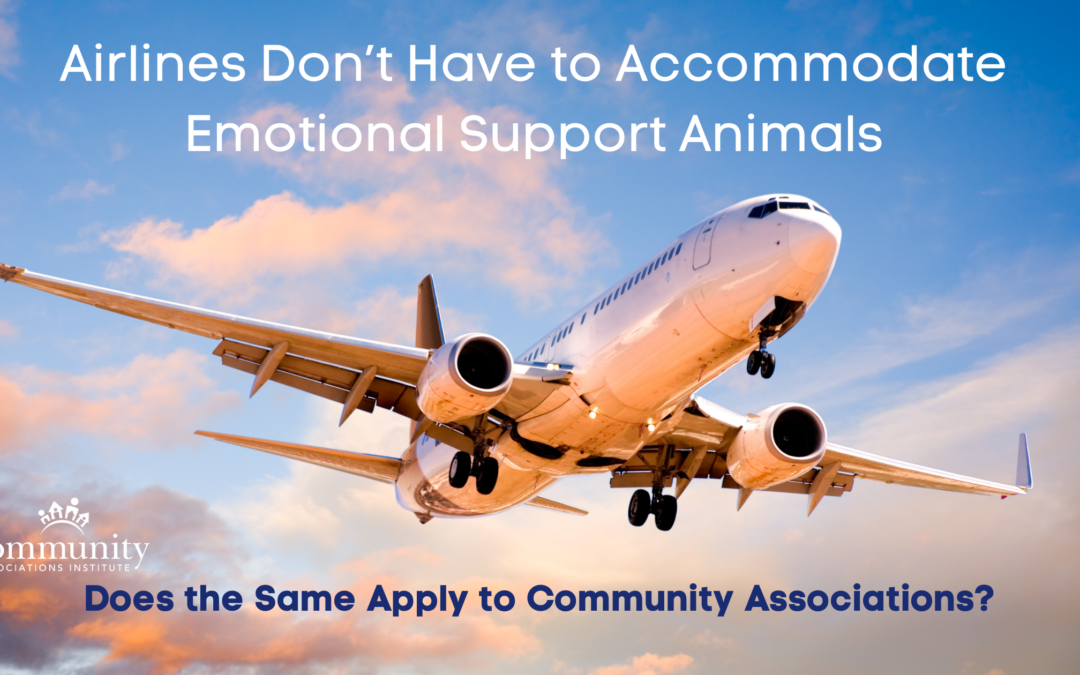On December 2, the U.S. Department of Transportation announced it is revising its Air Carrier Access Act (ACAA) regulation on the transport of service animals by air to ensure a safe and accessible air transportation system. According to an article in The Washington Post, industry trade group Airlines for America estimated the number of emotional support animals traveling aboard commercial flights increased from 481,000 in 2016 to 751,000 in 2017.
In the final rule, airlines will no longer be required to accommodate travelers who want to fly with emotional support animals such as pigs, rabbits, and turkeys. In addition, the rule:
- Defines a service animal as a dog that is individually trained to do work or perform tasks for the benefit of a person with a disability.
- No longer considers an emotional support animal to be a service animal.
- Requires airlines to treat psychiatric service animals the same as other service animals.
- Allows airlines to require forms developed by DOT attesting to a service animal’s health, behavior, and training. If taking a long flight, the owners also must confirm that the service animal can either not relieve itself or can relieve itself in a sanitary manner.
- Allows airlines to limit the number of service animals traveling with a single passenger with a disability to two service animals.
- Continues to allow airlines to refuse transportation to service animals that exhibit aggressive behavior and that pose a direct threat to the health or safety of others.
The final rule on Traveling by Air with Service Animals can be found here.
People may believe this new rule for airlines translates easily to housing providers. Unfortunately, it isn’t that simple. Housing providers (including community associations) follow other state laws and rules to reasonably accommodate requests for emotional support and service animals. Here are a few key differences:
Different laws apply. The ACAA is the statute that applies to assistance animals on airlines, while the federal Fair Housing Act (FHA) is the law that applies to assistance animals in community associations.
Difference in rulemaking authority. The Federal Aviation Administration Reauthorization Act of 2018 specifically provided rulemaking authority to the DOT for service animals and emotional support animals in airline cabins. By contrast, the FHA doesn’t provide HUD with the same expansive regulatory authority. This type of change in the FHA would be legislative and not regulatory, meaning an act of Congress would be required—which brings its own set of challenges.
Guidance for housing providers. This year, HUD offered clarification that helps community associations handle reasonable accommodation requests for assistance animals, including those that provide emotional support. Two of the main points include:
Documentation from the internet. Some websites sell certificates, registrations, and licensing documents for assistance animals to anyone who answers certain questions or participates in a short interview and pays a fee. Under the FHA, a housing provider may request reliable documentation when an individual requesting a reasonable accommodation has a disability and disability-related need for an accommodation that is not obvious or otherwise known. In HUD’s experience, such documentation from the internet is not, by itself, sufficient to reliably establish that an individual has a non-observable disability or disability-related need for an assistance animal.
By contrast, many legitimate, licensed health care professionals deliver services remotely, including over the internet. One reliable form of documentation is a note from a person’s health care provider that confirms a person’s disability and/or need for an animal when the provider has personal knowledge of the individual.
Types of animals. HUD also clarifies the types of animals that may be associated with emotional support or other assistance. The guidance differentiates between animals that are typically found in households (dogs, cats, etc.) and “unique” animals that do not typically live in a home, such as livestock. An individual seeking a reasonable accommodation for a “unique” animal will face a “substantial burden” in demonstrating how this animal directly meets a disability-related need.
Resources
- CAI’s Interpretation of HUD Guidance for Homeowners, Boards & Community Managers
- HUD Official Guidance Document on Assistance Animals
- HUD Fact Sheet on Guidance for Assistance Animals
- CAI’s Public Policy on Pets and Assistance Animals



